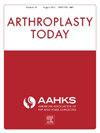Preoperative Patient Education as a Tool for Reducing Postoperative Opioid Use Following Primary Total Hip Arthroplasty: One Institution’s Experience
IF 2.1
Q3 ORTHOPEDICS
引用次数: 0
Abstract
Background
Minimizing postoperative opioids remaining after total hip arthroplasty (THA) is important for patient outcomes and community safety. The purpose of this study was to investigate whether completion of one preoperative patient education class prior to THA was associated with reduced opioid consumption at 2 weeks postoperatively. Secondary goals included evaluating whether satisfaction scores and postoperative healthcare utilization were impacted by class attendance, and whether demographic characteristics varied between groups that may highlight care disparities for our practice to address.
Methods
Patients undergoing primary THA between January 2022 and December 2024 at a single large academic institution were retrospectively evaluated for inclusion, identifying 372 patients who completed the education class and 30 patients who did not. All patients received a multimodal perioperative pain management protocol standardized at our institution.
Results
The number of morphine milligram equivalents (MMEs) consumed in the 2 weeks following THA was significantly lower among the class completion group (84.60 vs 127.30 MMEs; P = .04). On multivariable analysis, patients who attended the preoperative education class consumed 41.57 fewer MMEs compared to those who do not attend (95% confidence interval: −75.87 to −7.27; P = .018). No differences in complications, 2-week refill requests, emergency department visits, or readmission were noted. Functional outcome and satisfaction scores were high among both groups.
Conclusions
THA patients who completed an education class preoperatively consumed significantly fewer prescribed opioids as measured at the 2-week mark following surgery compared to those who did receive education. Our results support the role of patient education in reducing opioid use following arthroplasty.
术前患者教育作为减少初次全髋关节置换术后阿片类药物使用的工具:一个机构的经验
背景:减少全髋关节置换术(THA)术后残留阿片类药物对患者预后和社区安全至关重要。本研究的目的是调查THA术前患者教育课程的完成是否与术后2周阿片类药物消耗减少有关。次要目标包括评估满意度评分和术后医疗保健利用是否受到课堂出勤的影响,以及组间人口统计学特征是否存在差异,这可能会突出我们实践中需要解决的护理差异。方法回顾性评估2022年1月至2024年12月在一家大型学术机构接受初级THA治疗的患者,确定372名完成教育课程的患者和30名未完成教育课程的患者。所有患者均接受了我院标准化的多模式围手术期疼痛管理方案。结果完成课程组THA术后2周吗啡毫克当量(MMEs)用量(84.60 vs 127.30 MMEs)显著低于完成课程组(P = 0.04)。在多变量分析中,参加术前教育课程的患者比未参加的患者消耗的MMEs减少41.57(95%置信区间:−75.87至−7.27;P = 0.018)。并发症、2周再填充请求、急诊科就诊或再入院均无差异。两组患者的功能结局和满意度得分均较高。结论:术前完成教育课程的tha患者在术后2周时消耗的处方阿片类药物明显少于接受教育的患者。我们的结果支持患者教育在减少关节置换术后阿片类药物使用中的作用。
本文章由计算机程序翻译,如有差异,请以英文原文为准。
求助全文
约1分钟内获得全文
求助全文
来源期刊

Arthroplasty Today
Medicine-Surgery
CiteScore
2.90
自引率
0.00%
发文量
258
审稿时长
40 weeks
期刊介绍:
Arthroplasty Today is a companion journal to the Journal of Arthroplasty. The journal Arthroplasty Today brings together the clinical and scientific foundations for joint replacement of the hip and knee in an open-access, online format. Arthroplasty Today solicits manuscripts of the highest quality from all areas of scientific endeavor that relate to joint replacement or the treatment of its complications, including those dealing with patient outcomes, economic and policy issues, prosthetic design, biomechanics, biomaterials, and biologic response to arthroplasty. The journal focuses on case reports. It is the purpose of Arthroplasty Today to present material to practicing orthopaedic surgeons that will keep them abreast of developments in the field, prove useful in the care of patients, and aid in understanding the scientific foundation of this subspecialty area of joint replacement. The international members of the Editorial Board provide a worldwide perspective for the journal''s area of interest. Their participation ensures that each issue of Arthroplasty Today provides the reader with timely, peer-reviewed articles of the highest quality.
 求助内容:
求助内容: 应助结果提醒方式:
应助结果提醒方式:


